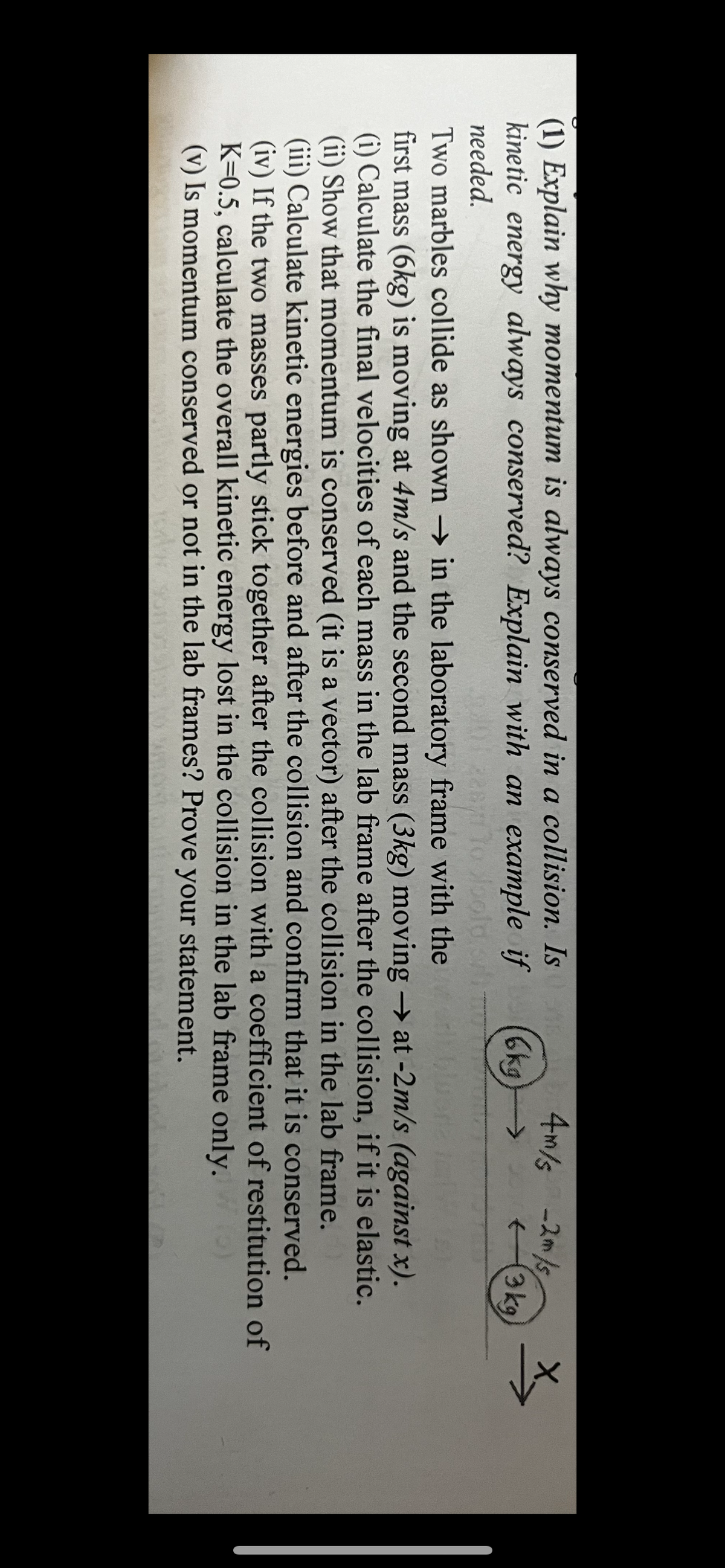Is (1) Explain why momentum is always conserved in a collision. kinetic energy always conserved? Explain with an example needed. if to loold.sv
Is (1) Explain why momentum is always conserved in a collision. kinetic energy always conserved? Explain with an example needed. if to loold.sv
University Physics Volume 3
17th Edition
ISBN:9781938168185
Author:William Moebs, Jeff Sanny
Publisher:William Moebs, Jeff Sanny
Chapter5: Relativity
Section: Chapter Questions
Problem 43P: In a frame at rest with respect to the billiard table, a billiard ball of mass m moving with speed v...
Related questions
Question

Transcribed Image Text:4m/s -2m/s
6kg
←3 kg
(1) Explain why momentum is always conserved in a collision. Is
kinetic energy always conserved? Explain with an example if
needed.
to loold
Two marbles collide as shown in the laboratory frame with the
first mass (6kg) is moving at 4m/s and the second mass (3kg) moving → at -2m/s (against x).
(i) Calculate the final velocities of each mass in the lab frame after the collision, if it is elastic.
(ii) Show that momentum is conserved (it is a vector) after the collision in the lab frame.
(iii) Calculate kinetic energies before and after the collision and confirm that it is conserved.
(iv) If the two masses partly stick together after the collision with a coefficient of restitution of
K=0.5, calculate the overall kinetic energy lost in the collision in the lab frame only.
(v) Is momentum conserved or not in the lab frames? Prove your statement.
x
Expert Solution
This question has been solved!
Explore an expertly crafted, step-by-step solution for a thorough understanding of key concepts.
Step by step
Solved in 4 steps

Knowledge Booster
Learn more about
Need a deep-dive on the concept behind this application? Look no further. Learn more about this topic, physics and related others by exploring similar questions and additional content below.Recommended textbooks for you

University Physics Volume 3
Physics
ISBN:
9781938168185
Author:
William Moebs, Jeff Sanny
Publisher:
OpenStax

Modern Physics
Physics
ISBN:
9781111794378
Author:
Raymond A. Serway, Clement J. Moses, Curt A. Moyer
Publisher:
Cengage Learning

Physics for Scientists and Engineers
Physics
ISBN:
9781337553278
Author:
Raymond A. Serway, John W. Jewett
Publisher:
Cengage Learning

University Physics Volume 3
Physics
ISBN:
9781938168185
Author:
William Moebs, Jeff Sanny
Publisher:
OpenStax

Modern Physics
Physics
ISBN:
9781111794378
Author:
Raymond A. Serway, Clement J. Moses, Curt A. Moyer
Publisher:
Cengage Learning

Physics for Scientists and Engineers
Physics
ISBN:
9781337553278
Author:
Raymond A. Serway, John W. Jewett
Publisher:
Cengage Learning

Principles of Physics: A Calculus-Based Text
Physics
ISBN:
9781133104261
Author:
Raymond A. Serway, John W. Jewett
Publisher:
Cengage Learning

Physics for Scientists and Engineers with Modern …
Physics
ISBN:
9781337553292
Author:
Raymond A. Serway, John W. Jewett
Publisher:
Cengage Learning

Classical Dynamics of Particles and Systems
Physics
ISBN:
9780534408961
Author:
Stephen T. Thornton, Jerry B. Marion
Publisher:
Cengage Learning